|
 Athens,
the city of intellect, is a part of the Attica basin. Athens
is approached by air, by land or by sea with all the possible
ways and as the country's center has connections with each
area of the country. The city of Athens is the capital of
Greece and has a population of five million about. It is the
country's heart and the economic and industrial center, as
well as the political and cultural center. Athens,
the city of intellect, is a part of the Attica basin. Athens
is approached by air, by land or by sea with all the possible
ways and as the country's center has connections with each
area of the country. The city of Athens is the capital of
Greece and has a population of five million about. It is the
country's heart and the economic and industrial center, as
well as the political and cultural center.
Attica
is situated in the geographical center of Greece and is washed
by the Euboean, Saronic and Corinthian Gulfs. The peninsula
ends to the south at Cape Sounion.
The position of Attica in the Eastern Mediterranean basin has
made it necessary to built a large harbor there, like the
Athenians did at Piraeus since antiquity. Piraeus is still the
largest harbor in the country and facilitates communications
in the area.

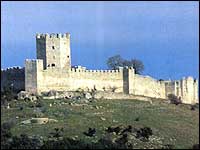 The
castle of Platamon is a fortress-town of the middle Byzantine
period (10th century A.D.). It lies at the south-east foot of
mount Olympos, at a strategic position which controls the
route leading from Macedonia to Thessaly and South Greece.
Excavations conducted in 1995 brought to light the traces of a
Hellenistic fortification, dated to the 4th century B.C. This
confirms the suggestion that the site of the castle was
occupied by the ancient city of Herakleion, "the first
city of Macedonia..." after the Tempe valley, according
to an ancient literary source dated to 360 B.C. Habitation on
the site continued until the 4th century A.D. The Byzantine
wall was restored by the Franks after 1204 and again by the
Byzantines in the 14th century. At the end of the 14th century
the fortress was captured by the Turks and was again rebuilt
but its inhabitants continued to be Christians. In the Second
World War (1941) it was bombed by the German army. The
castle of Platamon is a fortress-town of the middle Byzantine
period (10th century A.D.). It lies at the south-east foot of
mount Olympos, at a strategic position which controls the
route leading from Macedonia to Thessaly and South Greece.
Excavations conducted in 1995 brought to light the traces of a
Hellenistic fortification, dated to the 4th century B.C. This
confirms the suggestion that the site of the castle was
occupied by the ancient city of Herakleion, "the first
city of Macedonia..." after the Tempe valley, according
to an ancient literary source dated to 360 B.C. Habitation on
the site continued until the 4th century A.D. The Byzantine
wall was restored by the Franks after 1204 and again by the
Byzantines in the 14th century. At the end of the 14th century
the fortress was captured by the Turks and was again rebuilt
but its inhabitants continued to be Christians. In the Second
World War (1941) it was bombed by the German army.

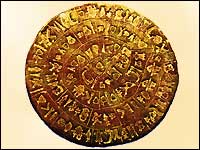 Crete
is the largest island in Greece and the fifth
largest in the Mediterranean. It has an area of
8,300 sq. km, a coastline of 1,040 km, and a population
of 500,000 Crete
is the largest island in Greece and the fifth
largest in the Mediterranean. It has an area of
8,300 sq. km, a coastline of 1,040 km, and a population
of 500,000
3000
BC. The Egyptians where trading all their goods sailing along
the Nile river. The main commerce activities at that time
where taking place along the banks of the river. When they
were coming close to the Delta of the Nile where the river was
meeting the Mediterranean they were staring at the big sea and
never attempted to sail through.
They
were calling it the "Big Blue". By that time the
Cretans were sailing all over the Mediterranean Sea trading
goods all over the place. They were also doing the commerce
for the Egyptians who never tried to explore the "Big
Blue".
The
"Big Blue" is all our hopes, all our dreams, all the
things in life that we shouldn't miss. It might be hard to
explore all the Med Sea but we are sure that visiting the
island of Crete is a chance that you shouldn't ignore.
Full
of tropical beaches, traditional villages, everyone with a
different history, a huge variety of gorgeous landscapes,
remains from ancient civilizations, you've got people here
writing history for the last five thousand years. N.
Kazantzakis was inspired and wrote his famous book "
Zorba the Greek" in Crete.
Crete
is the one for those who want it all.

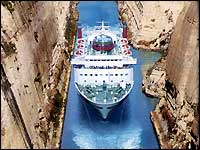 The
Korinth Canal joined the Saronic Gulf with the Korinthian Gulf
in 1893. However it had been thought of as early as 600 BC by
Periander. Since in those days the technology was not yet
available, and wouln't be for 2000 years, ships were rolled
from one gulf to the other on specially designed 'roller
skates.' The Canal has a length of about 6.2 km (about 4 miles),
and the width is about 25 meters (about 70 feet). Height from
sea level reaches about 80 meters (about 240 feet) at places.
Apart from the canal, the other important claim to fame, is
the 'Souvlaki' places where a souvlaki on a stick, with a
slice of bread, will set you back DRA 170. A great and cheap
way to fill an empty stomach. The
Korinth Canal joined the Saronic Gulf with the Korinthian Gulf
in 1893. However it had been thought of as early as 600 BC by
Periander. Since in those days the technology was not yet
available, and wouln't be for 2000 years, ships were rolled
from one gulf to the other on specially designed 'roller
skates.' The Canal has a length of about 6.2 km (about 4 miles),
and the width is about 25 meters (about 70 feet). Height from
sea level reaches about 80 meters (about 240 feet) at places.
Apart from the canal, the other important claim to fame, is
the 'Souvlaki' places where a souvlaki on a stick, with a
slice of bread, will set you back DRA 170. A great and cheap
way to fill an empty stomach.

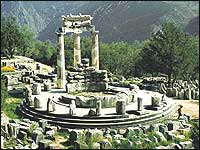 The
first museum of Delphi was built in 1903 on the plans of the
French architect Tournaire and was later incorporated in a
larger edifice, constructed in 1938. The rearrangement of the
exhibition was carried out gradually and was finally completed
in 1980. In 1974, a new room was added for the exhibition of
the gold and ivory finds from the sanctuary. A project for the
further enlargement of the museum, which will improve the
display of the finds as well as the appearance of the building,
has already been approved by the Ministry of Culture. The
museum is actually an integral part of the sanctuary and
contains exclusively finds from the site of Delphi, mostly
offerings and architectural parts. The
first museum of Delphi was built in 1903 on the plans of the
French architect Tournaire and was later incorporated in a
larger edifice, constructed in 1938. The rearrangement of the
exhibition was carried out gradually and was finally completed
in 1980. In 1974, a new room was added for the exhibition of
the gold and ivory finds from the sanctuary. A project for the
further enlargement of the museum, which will improve the
display of the finds as well as the appearance of the building,
has already been approved by the Ministry of Culture. The
museum is actually an integral part of the sanctuary and
contains exclusively finds from the site of Delphi, mostly
offerings and architectural parts.

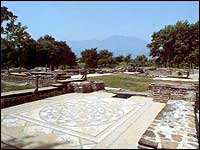 The ancient Dion, the sacred city of Macedonians, is
sited in a 13 km distance from Katerini and about 7 km one
from the national motorway between Thessaloniki and Athens. It
was discovered at the northern feet of the Olympus but the
time of its establishment has not been precisely estimated yet.
It is regarded as a creating of the Macedonian and Peraevian
kings, always comprising a crucial crossroad of grea strategic
importance.... The ancient Dion, the sacred city of Macedonians, is
sited in a 13 km distance from Katerini and about 7 km one
from the national motorway between Thessaloniki and Athens. It
was discovered at the northern feet of the Olympus but the
time of its establishment has not been precisely estimated yet.
It is regarded as a creating of the Macedonian and Peraevian
kings, always comprising a crucial crossroad of grea strategic
importance....

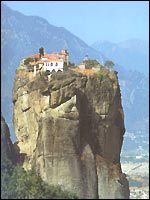 Meteora
is from the biggest and most important group of monasteries in
Greece after those in Mount
Athos. We can locate the first traces of their
history from 11th c. when the first hermits settled there. The
rock monasteries have been characterized by Unesco as a unique
phenomenon of cultural heritage and they form one of the most
important stations of cultural map of Greece. Meteora
is from the biggest and most important group of monasteries in
Greece after those in Mount
Athos. We can locate the first traces of their
history from 11th c. when the first hermits settled there. The
rock monasteries have been characterized by Unesco as a unique
phenomenon of cultural heritage and they form one of the most
important stations of cultural map of Greece.

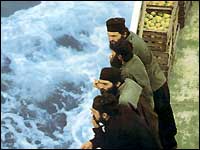 Some
38 kilometres east of Poligiros and after a trip up the slopes
of Mt. Holomondas, through forests, vineyards, vegetable
patches and flower gardens or along sandy beaches, one comes
first to picturesque Arnea, followed by Stagira, Aristotle's
birthplace, Ierissos by the sea, and Nea Roda before arriving
at Tripiti. Opposite lies the emerald islet of Amou-liani. Some
38 kilometres east of Poligiros and after a trip up the slopes
of Mt. Holomondas, through forests, vineyards, vegetable
patches and flower gardens or along sandy beaches, one comes
first to picturesque Arnea, followed by Stagira, Aristotle's
birthplace, Ierissos by the sea, and Nea Roda before arriving
at Tripiti. Opposite lies the emerald islet of Amou-liani.
From
here the road descends to Ouranoupoli. Men wishing to visit Mt.
Athos can board a caique either at Ouranoupoli or Tripiti for
Dafni, and from there proceed by road to Karies, the capital
of Athos. This is the site of the peninsula's oldest church,
the Protatos (10th century), which is decorated with frescoes
by Manouil Panselinos, the last great painter of the
Macedonian School of Byzantine art.

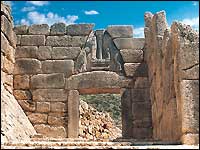 Mycenae,
the legendary home of the Atreides, is situated upon a small
hill-top on the lower slopes of Euboea Mountain, between two
of its peaks, on the road leading from the Argolic Gulf to the
north (Corinth, Athens, etc.). Mycenae,
the legendary home of the Atreides, is situated upon a small
hill-top on the lower slopes of Euboea Mountain, between two
of its peaks, on the road leading from the Argolic Gulf to the
north (Corinth, Athens, etc.).
The site was inhabited since Neolithic
times (about 4000 BC) but reached its peak during the Late
Bronze Age (1350-1200 BC), giving its name to a civilization
which spread throughout the Greek world. During that period,
the acropolis was surrounded by massive "cyclopean"
walls
which were built in three stages (ca.1350, 1250 and 1225 BC)
except on its SE flank where a steep ravine provided natural
defense.
In
1950, the Restoration Service undertook works on the tomb of
Clytemnestra, under the direction of An. Orlandos and E.
Stikas. In 1954, E. Stikas consolidated and restored the
megaron, the area south of the "Lion Gate", and the
"Grave Circle B" and in 1955, the walls north of the
"Lion Gate" as well as the courtyard of the palace.

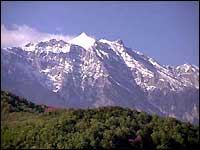 From
the sea level to the east and towering from the 700 m plateau
in the west, the peaks of Mt. Olympus reach a height of almost
3000 meters. From
the sea level to the east and towering from the 700 m plateau
in the west, the peaks of Mt. Olympus reach a height of almost
3000 meters.
This
sudden change in altitude has concentrated on the mountain an
amazingly large variety of plants, from typical Mediterranean
species to rare plants of the alpic zone. There have been
observed and recorder over 1700 plant species, 25 per cent of
the Greek flora. In the naked alpic zone there are more than
150 plant species. Of Peninsula, and 23 alone on Mt. Olympus.
The
wildlife of Mt. Olympus includes a significant variety of
species. 32 species of mammals and 108 species of bird, among
which many birds of prey have been recorded. In ancient times
there were lions, as is described by Pausanias, and up until
the 16th century, bears

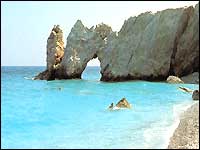 Skiathos
is one of the first unknown paradise which was discovered. Skiathos
is one of the first unknown paradise which was discovered.
Until then,
Skiathos was only known from Papadiamantis.In the beautiful
beaches, hotels started to build and the traffic began to
increase.
The small boat of Pashalis, which departed from Pefki of Evia,
was replaced by ferries and the Flying Dolphins (Hydrofoils)
made the trip more pleasant and comfortable.
So,
Skiathos became one of the most famous islands in Greece.

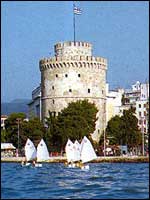 The
capital of Macedonia
and second largest city of Greece. The
capital of Macedonia
and second largest city of Greece.
It
was first established in 316 B.C. by Kassandros
and named after his wife, Thessaloniki,
sister of Alexander the Great.
It is here that Paul, the Apostle of Nations,
first brought the message of Christianity (50
A.D.) and that Demetrius, a Roman officer died in martyrdom,
thus becoming the holy patron of the city for ever (303 A.D.).
Thessaloniki
becomes the second important city of the Byzantine
Empire, next to Konstantinople,
ornamented with numerous majestic and glamorous architectural
works that display all forms of Byzantine art.
After
this illustrious era, the enemies take over.
But each time, after every catastrophe, Thessaloniki
reexalts her splendour, dressed in her eternal garment of
ancient and Byzantine glory.

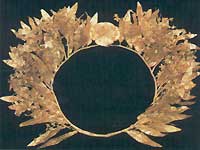 On
the discovery of the Royal Tombs of Vergina
(Aigai) in 1977, an immediate programme was launched to
preserve the magnificent murals which adorned them. At the
same time a conservation
laboratory was set up on the spot to save
and restore the extremely important portable objects
they contained. For the preservation of the Royal Tombs
themselves a subterranean structure was built in 1993 to
encase and protect the ancient monuments by maintaining a
constant temperature and humidity, both indispensable for the
preservation of the wall paintings. On
the discovery of the Royal Tombs of Vergina
(Aigai) in 1977, an immediate programme was launched to
preserve the magnificent murals which adorned them. At the
same time a conservation
laboratory was set up on the spot to save
and restore the extremely important portable objects
they contained. For the preservation of the Royal Tombs
themselves a subterranean structure was built in 1993 to
encase and protect the ancient monuments by maintaining a
constant temperature and humidity, both indispensable for the
preservation of the wall paintings.

 The
kingdom of adventure, join our world for a super time and
splash into the fun with or without getting wet. Feel the
thrill and the speed of the waterslides. Enjoy the view
floating down the river rock your self on the waves. Build
your body with aerobics and aqua-aerobics, catch the ball and
earn points for your team on the beach volley participate in
games and become the winner of the day. Enjoy your meal at one
of our innumerous places, relax on the hydro massage lie on
the deck chair and get tanned. Get excited and surprised with
much more… The
kingdom of adventure, join our world for a super time and
splash into the fun with or without getting wet. Feel the
thrill and the speed of the waterslides. Enjoy the view
floating down the river rock your self on the waves. Build
your body with aerobics and aqua-aerobics, catch the ball and
earn points for your team on the beach volley participate in
games and become the winner of the day. Enjoy your meal at one
of our innumerous places, relax on the hydro massage lie on
the deck chair and get tanned. Get excited and surprised with
much more…
Visit
Waterland's Web site

|